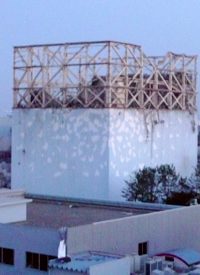
Owing to Japan’s nuclear power ordeal, the inevitable debate over nuclear power and its impact on the environment and human health is beginning to stir once again. Japan’s 9.0 magnitude earthquake and its resulting tsunami last Friday shattered the northeast section of the country, and its after-effects have devastated the infrastructure and surrounding landscape. The Fukushima Daiichi plant was designed for a 8.2 magnitude earthquake, which was the worst-expected earthquake for a 500-year time frame. Because the Richter scale is logarithmic, the quake that rocked the Fukushima nuclear power plant was actually more than six times its design withstandability.
A building housing the No. 1 nuclear reactor sector of the Fukushima nuclear power plant exploded last Saturday, though the containment structure for the reactor itself remains intact. Tokyo Electric Power Company (TEPCO) confirmed that the plant’s No. 3 reactor is now experiencing cooling function failure, which may lead to a similar explosion of the No. 1 reactor. Though Saturday’s explosion released small amounts of radiation into the air, it is reported that the levels are not dangerous to humans.
Yukio Edano, the government’s top spokesman, commented that the radioactivity levels near the Daini plant and the nearby Fukushima Daiichi plant, where there has been cooling system failure, pose no serious threat. He said they cannot rule out the possibility of another explosion, but if one does occur, “there would be no significant impact on human health.”
Despite lack of evidence of human danger, the debate over whether or not to continue embracing nuclear power, or expanding its capabilities, is arising, and will most likely intensify throughout the next few weeks, particularly in the United States.
Senators Chuck Schumer (D-N.Y.) and Mitch McConnell (R-Ky.) stated Sunday morning that they are still open to expanding nuclear power in the United States. In discussing America’s energy independence, Schumer commented on NBC’s Meet the Press, “Prices are up, our economy is being hurt by it, or could be hurt by it. So I’m still willing to look at nuclear [power, and] as I’ve always said it has to be done safely and carefully.” Likwise, McConnell told Fox News Sunday, “I don’t think right after a major environmental catastrophe is a very good time to be making American domestic policy.”
But timing is of the essence for politicians whose strategy is to hawk their agendas after catastrophes, especially ones on an international level. After all, as Rahm Emanuel once quipped, “Never let a good catastrophe go to waste” — in other words, don’t dwell on tragic consequences; use sentimental hype as an opportunity. The irony, though, in the case of the Fukushima Daiichi nuclear power plant is that, as we write, the released radiation has not been catastrophic enough to harm the public.
Nevertheless, Congressman Ed Markey (D-Mass.), a member of the House Energy and Commerce Committee, alleged in a letter to the Nuclear Regulatory Commission that the disaster displays “both the fragility of nuclear power plants and the potential consequences associated with a radiological release caused by earthquake-related damage.” Nuclear Energy Institute spokesman Mitch Singer retorted, “Even the most seriously damaged of Japan’s 54 reactors has not released radiation at levels that will harm the public, and that’s a testament to their design and construction, and how effective their employees have been at planning and response.”
Japan’s nuclear crisis will assuredly influence the politics of expanding nuclear operations and renewing licenses for existing plants in the United States. America currently has 104 operating power plant reactors, and up until this past weekend, President Obama, some environmental groups, and both Republicans and Democrats in Congress have agreed that nuclear power may be a suitable energy source for the future. But action may be sidelined as the world is riveted to the events unfolding in Japan’s earthquake-tsunami aftermath, very much including those related to its shaky nuclear infrastructure.
“I think it calls on us here in the U.S., naturally, not to stop building nuclear power plants but to put the brakes on right now until we understand the ramifications of what’s happened in Japan,” Senator Joe Lieberman, an active voice on energy policy, declared on the CBS program Face the Nation. White House spokesman Clark Stevens said the President is dedicated to pursuing a diverse set of energy sources and technology including wind, solar, natural gas, clean coal, and nuclear power. “Information is still coming in about the events unfolding in Japan, but the administration is committed to learning from them and ensuring that nuclear energy is produced safely and responsibly here in the U.S.”
The responses so far show little evidence of a future blockade on U.S. nuclear power, but Japan’s nuclear power ordeal will undoubtedly create unease throughout the social and political gamut and possibly slow the progression of a nuclear power future in America.
Photo: The No. 1 reactor of the Fukushima Daiichi Nuclear Power Plant after an explosion that blew out the outer walls of the unit, in Okumamachi, Fukushima Prefecture in Japan: AP Images



